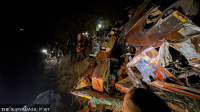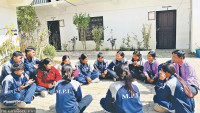National
‘Hatyara Sarkar’: Gen Z protesters call out state violence
Many insist they must continue the agitation to honour and seek justice for those killed in government crackdown.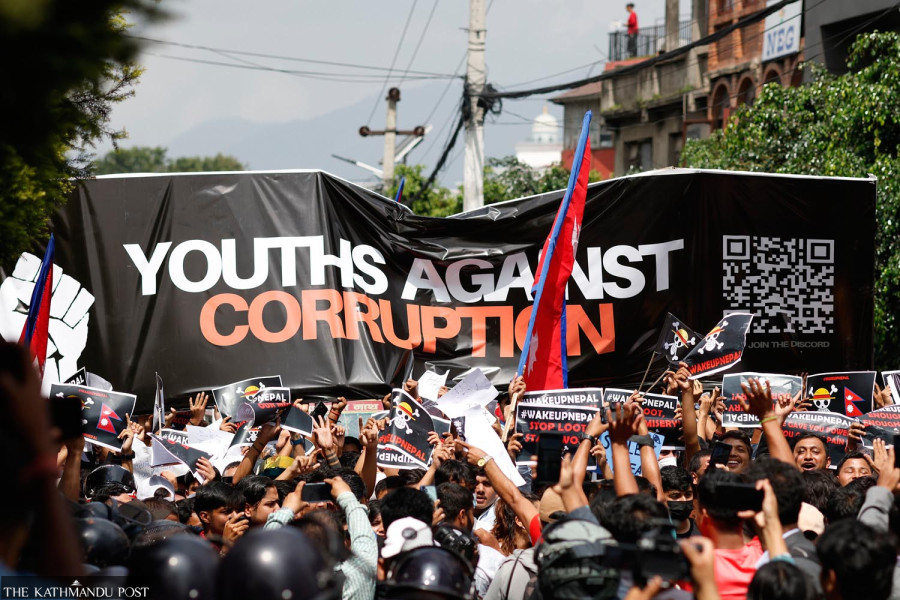
Aarati Ray
Ichhya Thapa, a Bachelor’s student of Journalism and Mass Communication, was one among the thousands of youths who had descended on Maitighar on Monday morning to protest rampant corruption and the government’s recent social media ban.
Thapa stayed at the protest site until around noon, retreating only after the first rounds of tear gas canisters were fired and the situation turned tense.
“This was supposed to be a peaceful protest, that’s why we were there,” Thapa told the Post later. “Looking at the news of deaths and injuries of the people we walked together with, I keep wishing this is all just a bad dream I could wake up from.”
The events of Monday were rooted in a digital movement that had been gathering momentum for weeks. The ‘Nepo Kid’ campaign, which took aim at the children of politicians and influential figures accused of living off corruption, had gained traction across platforms like TikTok and Reddit.
The government’s social media block added to the frustration, but the real trigger for the street protest was disillusionment with systemic corruption and failed leadership.
From early on, a social media page called ‘Gen.Z Nepal’ (official page related to Gen Z movement) and other activist pages had been sharing instructions, do’s and don’ts of protest, calls to remain peaceful, and warnings to watch out for outsiders who might infiltrate the demonstration.
The emphasis on non-violence even drew praise from activists and content creators, who noted Gen Z Nepal’s repeated clarification that the movement was not aligned to any political party or pro-monarchy agenda, despite attempts by figures like Durga Prasai and Hridayendra Shah, the grandson of deposed monarch Gyanendra, to link themselves to the rally.
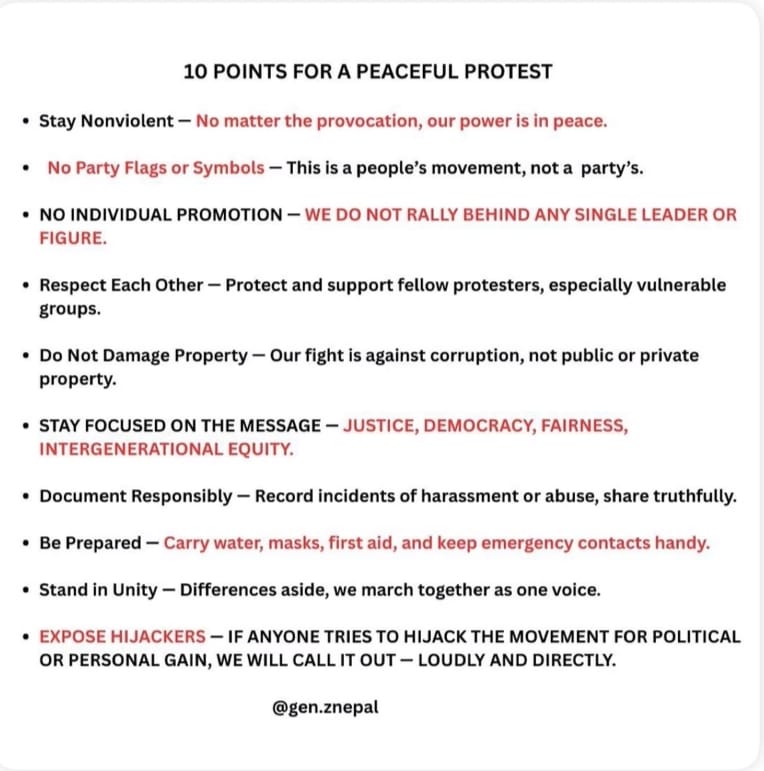
By 9 am, hundreds of young people had gathered at Maitighar. There was a palpable sense of enthusiasm and energy in the air. Students in uniforms carried placards, sang songs, and shouted slogans. When the march set off towards Baneshwar around 10:30 am, it remained peaceful. Some younger participants—students in grades nine and ten—were even overheard advising passersby not to harm the plants and trees along the route.
Though unified under the broad banner of a Gen Z protest, those in the crowd arrived with different motivations; some were angry at rampant corruption, while others were outraged over the government’s decision to block social media. Still others were there with a simple curiosity about how their peers were mobilising and what statement their Gen Z generation could make.
Before the situation escalated, participants described a movement rooted in frustration but determined to remain non-partisan. A 26-year-old protester explained why organisers had resisted efforts to politicise the rally.
“As these leaders have been in the halls of power for long, with power circulating among the same old leaders, the country is currently in deep trouble,” the protester, who wished to remain anonymous, said. “That’s why we requested political leaders to stay away.”
Another protester, Rawati Kafle, added, “The government has not understood people’s frustration. Mothers are seeing their children return from foreign countries in coffins. If this continues to go unrecognised, I fear the situation here could be even more serious than in Bangladesh.”
Kafle was referring to the student-led protests in the South Asian country in 2024 that ended with prime minister Sheikh Hasina being chased out of Bangladesh.
Younger voices echoed the same sense of disillusionment. Taya Chandra Pandey, who had just graduated from grade 12, came with friends. “We are confused about what to do,” he said. “And at a moment like this, the government deciding to block social media is like asking us to go abroad. They are doing everything except creating a favourable situation in the country.”
Many of the protesters shouted slogans demanding an end to rampant corruption, investigation of those responsible, and their punishment as per the law.
For Pandey, the protests establish the existence of something his generation had long been accused of lacking: staying power. “Looking at this high turnout of Gen Z, I do see hope,” he said. “This is not being done by any political party; it’s purely driven by Gen Z. We have shown we have the power to sustain this movement.”
Others framed their participation as a reaction to systemic injustice. Subha Yujang Thapa, a 22-year-old IT student, said, “We came here as corruption has gone overboard in Nepal. The money we are paying is being used to fund the lavish lifestyles of the seven generations of politicians. If the government can ban social media so fast, why can’t they act with the same urgency to complete projects?”
Citing a recent accident in which a vehicle carrying a provincial minister struck an 11-year-old girl, Yujang Thapa questioned accountability at the highest level. “The prime minister’s response was baffling. Would it have been the same if KP Oli had been struck by an ordinary citizen’s vehicle?”
A 23-year-old Bachelor’s-level student said her presence was about the demand for freedom of speech and competence in governance.
She pointed to the exodus of Nepal’s youth for jobs and studies. “The US is pushing us out, Australia is pushing us out. At the very least, our own country should provide us with a safe future. That is why we are here, to take our future from the hands of incapable leaders.”
Even those younger still, students in secondary levels, attended in groups. “We thought we should do something, learn and participate in change,” one of them said.
Still, there was unease about the lack of structure when the crowd swelled.
Some participants said they struggled to follow the instructions circulated online.
“Unserious groups were trying to manipulate the masses, to divert Gen Z toward other agendas,” said journalism student Thapa. “Today felt like expectations versus reality. If there had been clear leadership, it would have been better. The main agenda was against corruption, but outside forces were pushing their own interests.”
The same sentiment was echoed by others who believed the absence of leadership left the movement vulnerable. “Had there been more planning, it could have been more successful,” one said.
Yet the presence of the older generation offered a reminder that this moment was part of a longer democratic struggle.
Binay Karki, 57, who had joined past movements for democracy, said the protest carried echoes of earlier battles. “We took part in similar protests previously while fighting for democracy, and today the youth are doing the same. The system we fought for is being misused, so it’s good to see youth aware and fight against corruption,” he said.
He also dismissed scepticism about Gen Z’s resolve, “This generation is more educated and informed than us. I think they can do better and change the corrupt system.”
For many in the crowd, the larger point remained unchanged; the protest had signalled a generational shift. As one IT student, Yusan Mainali, put it, “This protest may end after three days, but the energy of today shows something bigger. In the 2084 elections, we will choose capable leaders. That is where the real result will be seen.”
As the situation worsened and news of injuries and deaths spread, grief quickly gave way to outrage. Many protesters attribute the escalation not to the youths but to the state’s failure to respond responsibly.
“This happened because of the government’s lack of action and seriousness,” said Priya Sigdel, a social entrepreneur and co-founder of Hatti Hatti Nepal, who was present at the demonstrations.
“They claimed they fired rubber bullets, but in the hospitals, we saw real metal bullets. That shows the level of intent to silence youth and suppress voices against corruption.”
She also noted that political cadres with separate agendas had fueled the chaos. “They came to instigate both the crowd and the police, created discord, and then left. But Gen Z faced the consequences.”
By evening, the anger had moved online. Gen Z and other youths are expressing rage, disbelief, and trauma across social media. Hashtags and trends like Hatyara Sarkar (Murderer Government), ‘Resign Ramesh Lekhak’, ‘Resign KP Oli’, ‘Who do you call when police murders’, ‘We exposed their children and they started killing ours’ are trending.
One AI-generated image showing Prime Minister KP Oli with bloodied hands beside a photo of blood on the protest site had been shared more than 114,000 times by 8 pm.
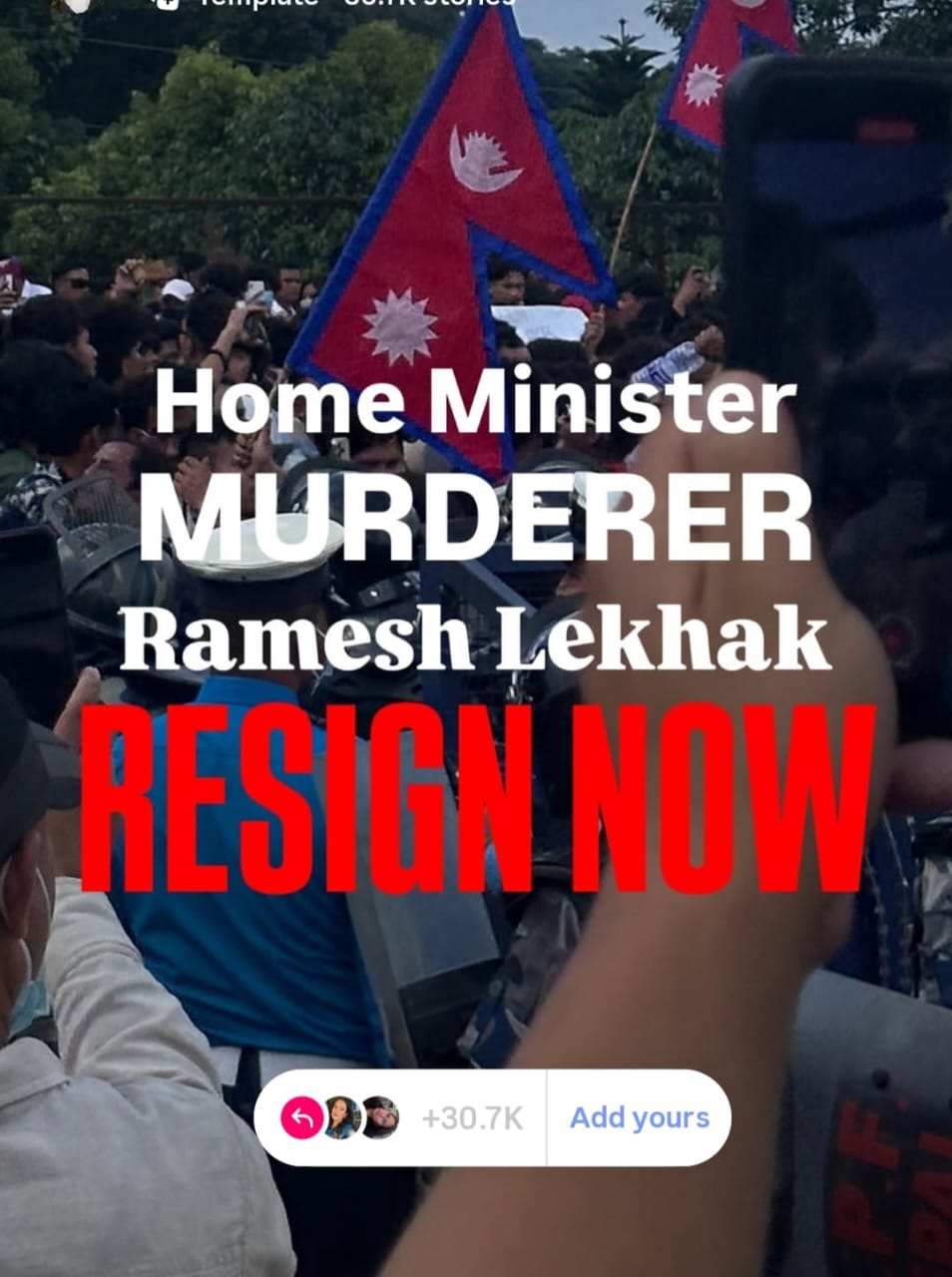
The Gen Z Nepal Instagram page, which had played a central role in organising the demonstrations, released a condolence statement around 6 pm and announced that all upcoming protests would be postponed indefinitely “to honour the deceased and ensure our movement never comes at the expense of human life.”
The announcement did not go down well with many of their followers. More than 120 comments appeared within minutes beneath the post, rejecting the decision to suspend the protests, insisting that they must continue the agitation in honour of those who had died.
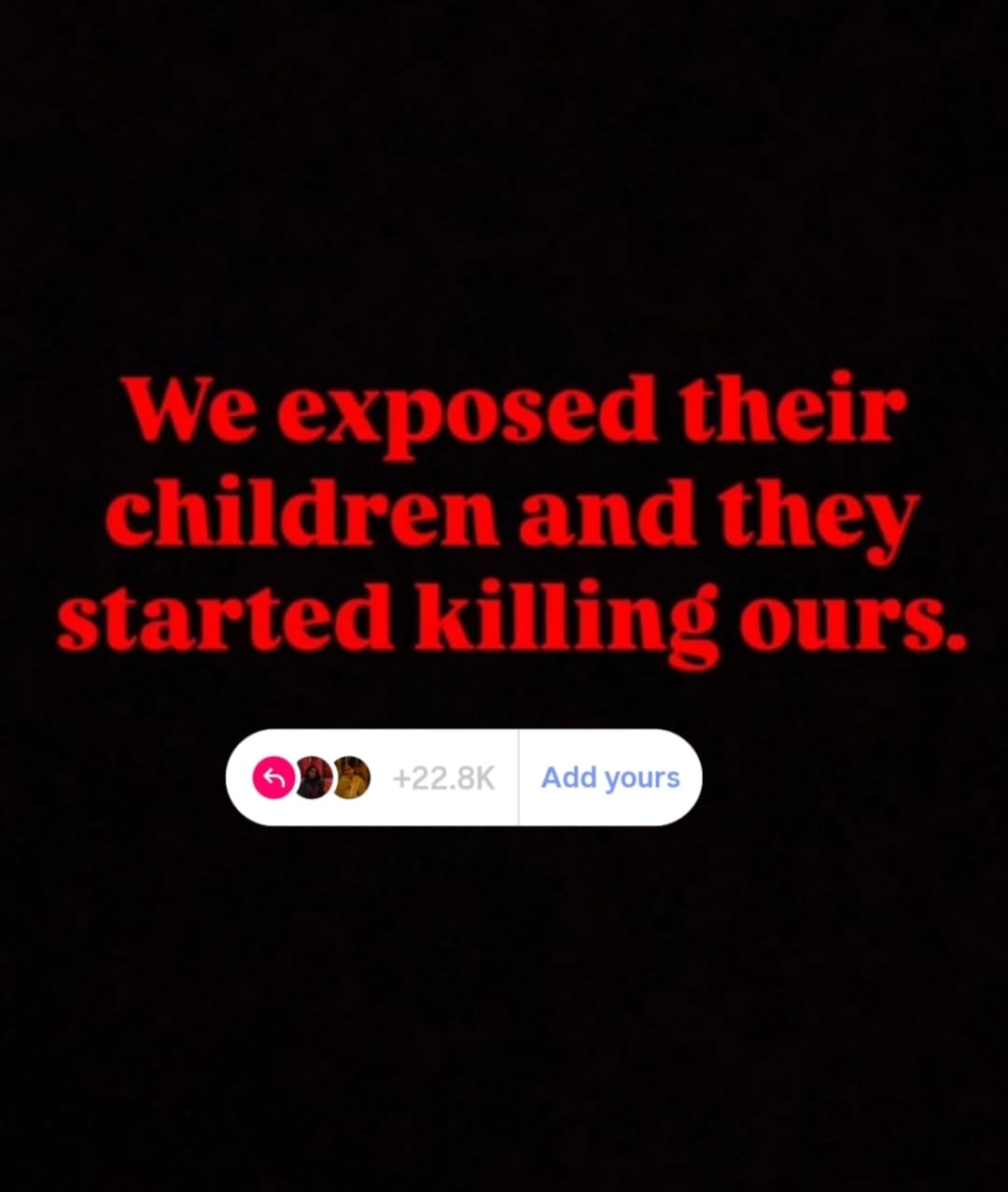
By nightfall, social media reflects a divided mood. Some traumatised young people are recounting their experiences of tear gas, seeing their friends injured and live shootings, urging for protests to stop and the resignation of politicians.
Others argue it is time to regroup and return even stronger. Many are even voicing anger at how some local and international media reports have reduced the movement to opposition against the social media ban, downplaying the larger fight against corruption.
Many have come forth in social media saying whether the movement halts or gathers in strength, one thing is clear: the anger of a generation has been unleashed, and its demand for accountability will not easily be silenced.
Sigdel says that for her and many at the protest, September 8 will remain a Black Day. “We cannot stop now,” she said. “So many innocent young ones passed away. If we stay silent, these leaders and their children will only continue with the same corrupt system. Now that the government has shown us we must die for them to listen, then we will die. But we won’t stop. Those responsible must be held accountable, and this government should resign.”




 22.16°C Kathmandu
22.16°C Kathmandu




